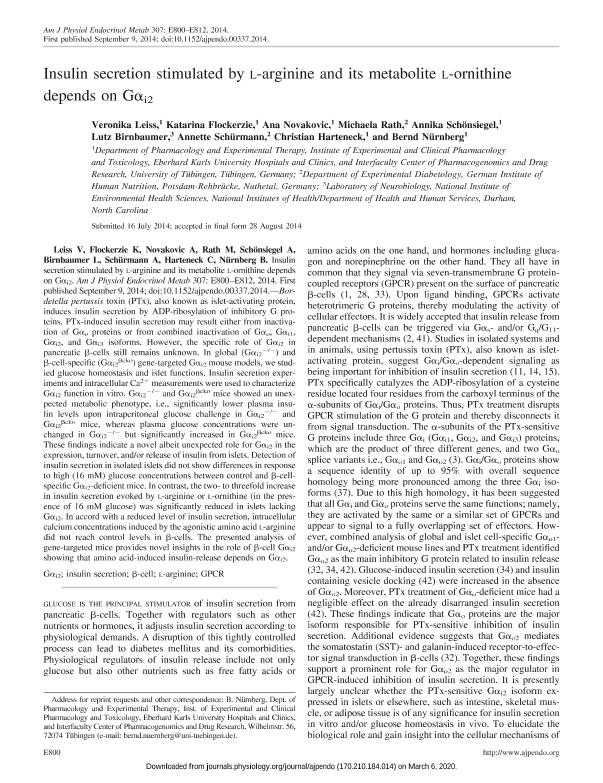Mostrar el registro sencillo del ítem
dc.contributor.author
Leiss, Veronika
dc.contributor.author
Flockerzie, Katarina
dc.contributor.author
Novakovic, Ana
dc.contributor.author
Rath, Michaela
dc.contributor.author
Schönsiegel, Annika
dc.contributor.author
Birnbaumer, Lutz

dc.contributor.author
Schürmann, Annette
dc.contributor.author
Harteneck, Christian
dc.contributor.author
Nürnberg, Bernd
dc.date.available
2020-03-06T13:22:20Z
dc.date.issued
2014-11-01
dc.identifier.citation
Leiss, Veronika; Flockerzie, Katarina; Novakovic, Ana; Rath, Michaela; Schönsiegel, Annika; et al.; Insulin secretion stimulated by L-arginine and its metabolite L-ornithine depends on Gα(i2); American Physiological Society; American Journal of Physiology - Endocrinology and Metabolism; 307; 1-11-2014; E800–E812
dc.identifier.issn
0193-1849
dc.identifier.uri
http://hdl.handle.net/11336/98903
dc.description.abstract
Bordetella pertussis toxin (PTx), also known as islet-activating protein, induces insulin secretion by ADP-ribosylation of inhibitory G proteins. PTx-induced insulin secretion may result either from inactivation of Gα(o) proteins or from combined inactivation of Gα(o), Gα(i1), Gα(i2), and Gα(i3) isoforms. However, the specific role of Gα(i2) in pancreatic β-cells still remains unknown. In global (Gα(i2)(-/-)) and β-cell-specific (Gα(i2)(βcko)) gene-targeted Gα(i2) mouse models, we studied glucose homeostasis and islet functions. Insulin secretion experiments and intracellular Ca²⁺ measurements were used to characterize Gα(i2) function in vitro. Gα(i2)(-/-) and Gα(i2)(βcko) mice showed an unexpected metabolic phenotype, i.e., significantly lower plasma insulin levels upon intraperitoneal glucose challenge in Gα(i2)(-/-) and Gα(i2)(βcko) mice, whereas plasma glucose concentrations were unchanged in Gα(i2)(-/-) but significantly increased in Gα(i2)(βcko) mice. These findings indicate a novel albeit unexpected role for Gα(i2) in the expression, turnover, and/or release of insulin from islets. Detection of insulin secretion in isolated islets did not show differences in response to high (16 mM) glucose concentrations between control and β-cell-specific Gα(i2)-deficient mice. In contrast, the two- to threefold increase in insulin secretion evoked by L-arginine or L-ornithine (in the presence of 16 mM glucose) was significantly reduced in islets lacking Gα(i2). In accord with a reduced level of insulin secretion, intracellular calcium concentrations induced by the agonistic amino acid L-arginine did not reach control levels in β-cells. The presented analysis of gene-targeted mice provides novel insights in the role of β-cell Gα(i2) showing that amino acid-induced insulin-release depends on Gα(i2).
dc.format
application/pdf
dc.language.iso
eng
dc.publisher
American Physiological Society

dc.rights
info:eu-repo/semantics/openAccess
dc.rights.uri
https://creativecommons.org/licenses/by-nc-sa/2.5/ar/
dc.subject
PROTEINA G(i2)
dc.subject
INSULIN DOSING
dc.subject
GPCR
dc.subject.classification
Bioquímica y Biología Molecular

dc.subject.classification
Ciencias Biológicas

dc.subject.classification
CIENCIAS NATURALES Y EXACTAS

dc.title
Insulin secretion stimulated by L-arginine and its metabolite L-ornithine depends on Gα(i2)
dc.type
info:eu-repo/semantics/article
dc.type
info:ar-repo/semantics/artículo
dc.type
info:eu-repo/semantics/publishedVersion
dc.date.updated
2019-10-28T18:26:49Z
dc.journal.volume
307
dc.journal.pagination
E800–E812
dc.journal.pais
Estados Unidos

dc.journal.ciudad
Bethesda
dc.description.fil
Fil: Leiss, Veronika. University of Tübingen. Department of Pharmacology and Experimental Therapy; Alemania
dc.description.fil
Fil: Flockerzie, Katarina. University of Tübingen. Department of Pharmacology and Experimental Therapy; Alemania
dc.description.fil
Fil: Novakovic, Ana. University of Tübingen. Department of Pharmacology and Experimental Therapy; Alemania
dc.description.fil
Fil: Rath, Michaela. German Institute of Human Nutrition. Department of Experimental Diabetology; Alemania
dc.description.fil
Fil: Schönsiegel, Annika. University of Tübingen. Department of Pharmacology and Experimental Therapy; Alemania
dc.description.fil
Fil: Birnbaumer, Lutz. National Institute ofEnvironmental Health Sciences. Laboratory of Neurobiology; Estados Unidos. Consejo Nacional de Investigaciones Científicas y Técnicas; Argentina
dc.description.fil
Fil: Schürmann, Annette. German Institute of Human Nutrition. Department of Experimental Diabetology; Alemania
dc.description.fil
Fil: Harteneck, Christian. University of Tübingen. Department of Pharmacology and Experimental Therapy; Alemania
dc.description.fil
Fil: Nürnberg, Bernd. University of Tübingen. Department of Pharmacology and Experimental Therapy; Alemania
dc.journal.title
American Journal of Physiology - Endocrinology and Metabolism
dc.relation.alternativeid
info:eu-repo/semantics/altIdentifier/url/https://journals.physiology.org/doi/full/10.1152/ajpendo.00337.2014
dc.relation.alternativeid
info:eu-repo/semantics/altIdentifier/doi/http://dx.doi.org/10.1152/ajpendo.00337.2014
Archivos asociados
